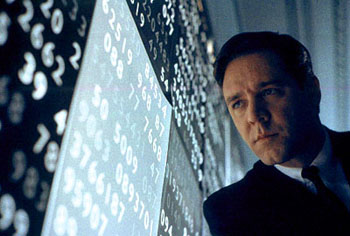![[Metroactive Movies]](/movies/gifs/movies468.gif)
[ Movies Index | Show Times | Silicon Valley | Metroactive Home | Archives ]
 Caseworker Russell Crowe angles for an Oscar in 'A Beautiful Mind.' Nutty Professor Russell Crowe gnashes Nash in 'A Beautiful Mind' THE SCHIZOPHRENIC DELUSIONS of John Forbes Nash Jr., according to his biographer Sylvia Nasar: "In his mind, he traveled to the remotest reaches of the globe: Cairo, Zebak, Kabul, Bangui, Thebes, Guyana, Mongolia. ... He was C.O.R.P.S.E. (a Palestinian Arab refugee), a great Japanese shogun, C1423, Esau, l'homme D'Or, Chin Hsiang, Job. ... Baleful deities--Iblis, Mora, Satan, Platinum Man, Titan, Nahipotleeron, Napoleon, Shickelgruber threatened him." And he lived in fear of the apocalyptic Day of Resolution of Singularities. Forbes, subject of the film A Beautiful Mind, was the Nobel Prize-winning mathlete and madman whose mental illness interrupted a brilliant career. This career included such discoveries as: Nash's Equilibrium in game theory and Nash's Theorem about the embedding of manifolds in Euclidean space. The illness was tragic, but at least Nash was spared, for a time, screenwriter Akiva Goldsman and director Ron Howard getting their hands on him. That time has ended. Not since the film Awakenings has the career of a scientist been subject to such terminal dumbing down. Russell Crowe brings a certain sway to the part of Nash--he's good with bemusement and panic. Still, Howard and Goldsman's anti-intellectual approach to the material insures A Beautiful Mind is a disease-of-the-week film shot in the dullest colors. Crowe's virility is shorted out here for 'Oscar-caliber acting"--the standard sloppy, shoe-gazing, awkward little boy portrait of an intellectual. His Nash is redeemed by true love (Jennifer Connelly, gorgeous as always but unable to draw a bead on her shying co-star). We have the usual tour of Cuckoo's Nest madhouses, before triumphs are received in alarming old-age makeup. The madman's deliriums--which were more vividly suggested in the film Pi, no doubt inspired by Nash's troubles--are presented as a plain Cold War spy drama, featuring Ed Harris as a spy in a snap-brim hat. Harris is inserted without tip-off into the plot, a clever strategy to make cinema out of the career of a man who spent most of his life staring at a chalkboard. Still, what Nash accomplished and what he saw could have been illustrated so much more thrillingly. As it stands, here's a film about an introverted man who needed a good woman behind him. Only love can cure schizophrenia. Hug a street lunatic today. Yes, the movie is different from the book, which outlined a fiercely competitive academic world that sometimes strained the sanity of those who lived in it. The movie-shall-be-different-than-the-book law doesn't mean all adaptations of real life must be crapified. Ours is an era when you can tell any kind of story in a movie, so there's no excuse for deleting troublesome subjects--such as Nash's pre-breakdown sex life, which included an illegitimate child, several male lovers and a George Michaels arrest. The "brute mental power" a colleague described in Nash is ignored in creating this fake-prestige movie, topped with a glop of derivative and repetitive James Horner music. Appropriately, it's a soundtrack that's enough to drive anyone insane.
A Beautiful Mind (PG-13), directed by Ron Howard, written by Akiva Goldsman, based on the book by Sylvia Nasar, photographed by Roger Deakins and starring Russell Crowe and Jennifer Connelly, opens at the Los Gatos Cinema and selected theaters. [ Silicon Valley | Metroactive Central | Archives ]
|
From the January 3-9, 2002 issue of Metro, Silicon Valley's Weekly Newspaper.
Copyright © 2002 Metro Publishing Inc. Metroactive is affiliated with the Boulevards Network.
For more information about the San Jose/Silicon Valley area, visit sanjose.com.